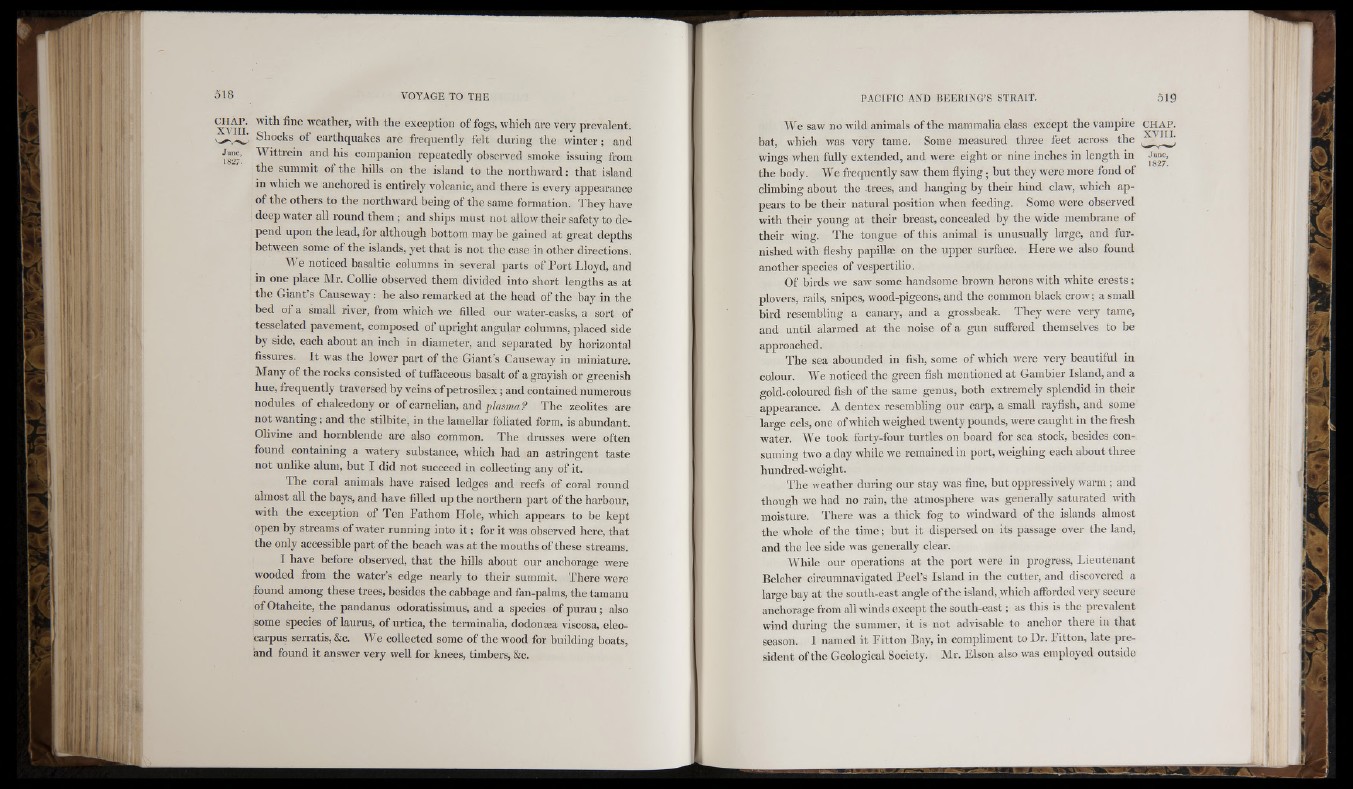
i;' t
iit f!
t
xIhii "ith the exception of fogs, which are very prevalent,
-ri.-v/ Shocks of earthquakes are frequently felt during the winter ; and
June,
1827.
AA"ittrein and his companion repeatedly observed smoke issuing from
the summit of the hills on the island to the northward; that island
in which we anchored is entirely volcanic, and there is every appearance
of the others to the northward being of the same formation. 'I'hey have
deep water all round them ; and ships must not allow their safety to depend
upon the lead, for although bottom may be gained at great depths
between some of the islands, yet that is not the case in other directions.
W e noticed basaltic columns in several parts of Port Lloyd, and
in one place Mr. Collie observed them divided into short lengths as at
the Giant's Causeway : he also remarked at the head of the bay in the
bed of a small river, from which we tilled our water-casks, a sort of
tesselated pavement, composed of upright angular columns, placed side
by side, each about an inch in diameter, and separated by horizontal
fissures. It was the lower part of the Giant’s Causeway in miniature.
Many of the rocks consisted of tutfaceous basalt of a grayish or greenish
hue, frequently traversed by veins of petrosilex ; and contained numerous
nodules of chalcedony or o f eavnehan, and plasma? The zeolites are
not wanting; and the stilbite, in the lamellar foliated form, is abundant.
Olivine and hornblende are also common. The drusses were often
found containing a watery substance, which had an astringent taste
not unlike alum, but I did not succeed in collecting any of it.
The coral animals have raised ledges and reefs of coral round
almost all the bays, and have filled up the northern part of the harbour,
with the exception of Ten Fathom Hole, which appears to be kept
open by streams of water running into i t ; for it was observed here, that
the only accessible part of the beach was at the mouths of these streams.
1 have before observed, that the hills about our anchorage w'ere
wooded from the water’s edge nearly to their summit. There were
found among these trees, besides the cabbage and fan-palms, the tamanu
of Otaheite, the pandanus odoratissimus, and a species of jmrau; also
some species of laurus, of urtica, the terminalia, dodonaea viscosa, eleo-
carpus serratis, &c. We collected some of the wood for building boats,
and found it answer very well for knees, timbers, &c.
We saw no wild animals of the mammalia class except the vampire
bat, whicli was very tame. Some measured three feet across the
wings when fully extended, and were eight or nine inches in length in
the body. We frequently saw them flying; but they were more fond of
climbing about the trees, and hanging by their hind claw, ivhich appears
to be their natural position when feeding. Some were observed
with their young at their breast, concealed by the wide membrane of
their wing. The tongue of this animal is unusually large, and furnished
with fleshy papillae on the upper surface. Here ive also found
another species of vespertilio.
Of birds we saw some handsome brown herons with white crests ;
plovers, rails, snipes, wood-pigeons, and the common black crow; a small
bird resembling a canary, and a grossbeak. They were very tame,
and until alarmed at the noise of a gun suffered themselves to be
approached.
The sea abounded in fish, some of ivhich ivere very beautiful in
colour. We noticed the green fish mentioned at Gambier Island, and a
gold-coloured fish of the same genus, both extremely splendid in their
appearance. A dentex resembling our carp, a small rayfish, and some
large eels, one of which weighed tiventy pounds, were caught in the fresh
water. We took forty-four turtles on board for sea stock, besides consuming
two a day while we remained in port, weighing each about three
hundred-weight.
The weather during our stay was fine, but oppressively warm ; and
though we had no rain, the atmosphere was generally saturated with
moisture. There was a thick fog to windward of the islands almost
the ivhole of the time; but it dispersed on its passage over the land,
and the lee side was generally clear.
AVhile our operations at the port were in progress, Lieutenant
Belcher circumnavigated Peel’s Island in the cutter, and discovered a
large bay at the south-east angle of the island, which afforded very secure
anchorage from all winds except the south-east; as this is the prevalent
wind during the summer, it is not advisable to anchor there in that
season. 1 named it Fitton Bay, in compliment to Dr. Litton, late president
ofthe Geological Society. Mr. Elson also was employed outside
r '